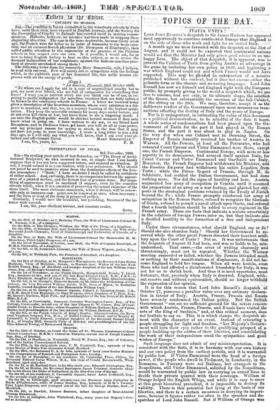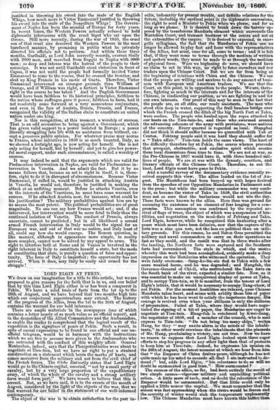TOPICS' •OF THE DAY.
ITALIA uNrrA !
Lonn Jon's Rus,sELL's despatch to Sir James Hudson has appeared Most.opportifiely to conVinee continental, Europe'that England is on the side of those who work and fight for an united Italy. - -. . 'A month ago we were favoured with the despatch of the 31st of August,' and it could not be expected that continental nations would see that the Minister bad only given good. advice in an un- happy form. The object of that despatch, it IS apparent, was to prevent the Cabinet of Turin froth giving Austria: an 'advantage in the game by imitating her own policy in 1859, _and be,riuning a
i
war which England couldn t and which France would have supported. This raw hei feuded 'ihiomtecuation of a missive published without the con ext, hilt it does of excuse either the pedantic:form or the obstinre and menacing language. Lord John Russell has now set himself. and England right with theEuroppan public, by promptly giving to the world a despatch which, we asi3 free to assume, had not only, in its ultimate shape, the sanction of the Queen, but substantially the sanction of the full Cabinet, at the sitting on the 20th. We may, therefore, accept it as the deliberate verdict of the Government upon most momentous train- sections affecting the destiny of Italy and the .peace of Europe. Nor is it unimportant, in estimating the value of this document as a political demonstration, to be mindful of the date it betun. A whole series of condemnations had been passed upon the GO- vernment of Turin for the part it bad played in the Roman•States, and the part it was about to play in Naples. OA the very day when our Cabinet met in Downing btreett the Emperor of Russia formally received his brother of Austria in Warsaw. AU the Powers, at least all the Potentates, who had censured Count Cavour and. Victor Emmanuel were there, exoePt -one, the French.Emperor. Continental Europe, with more or less asperity in its demeanour, had arrayed itself against Italy, for Count Cavour and Victor Emmanuel and Garibaldi are Italy. Moreover, the French Emperor had withdrawn his Minister, and the Russian Emperor had withdrawn his entire Legation from Turin ; while the Prince Regent of Prussia, through M. ilp Schleinitz, had scolded the. Italian Government, but had done nothing more. Nor did the signs of hostility end here. Austria augmented her army of occupation in Venetia until it assumed the proportions of an army on a war footing, and planted her out- posts in the strategical positions retained by the Treaty of Zurich beyond the Po ; 'while France promptly reinforced her army of occupation in the Roman States, refused to recognize the blockade of Gaeta,,refused to permit a naval attack upon Gaeta, and ordered that a fourth battalion should,. be added to every.regiment in,* French army. These are fade that indicate a serious uncertainty in the relations of foreign Powers inter se, but •they indicate also a' decided hostility to the formation-of a free and independent Italy.
Under these circumstances what should England say or 30? Should she also abandon Italy? Should her GovernMent be re- served while the other great. Powers directed their heaviest artil- lery upon the Cote of Turin ? Not so. It was unfortunate that the despatch of August 31 had been, and wits so liable to be, mis- understood. ' That, error,—the error of writing obseurely, and threateningly, . must not be repeated. Whether the Warsaw meeting sueoeeded or failed, whether the Powers intended much or nothing by their manifestations of displeasure, it did not come England to hold her tongue. When- all were hoitile,,evan those who had affected a disinterested friendship for Italyi iLvraa not for us to 'shrink back. And thus it is most opportune, meet fortunate, that, precisely when Italy is deserted; England, with- out reserve and withont, equivocation, should no longer 'withhold
.
the expression of her opinion. CI It is for this reason that Lord John Russell's despatch , of
October 27, possesses a peculiar value over any ordinary declare:-
tion in favour of Italy. Austria, France, Prussia and Ens& have severely condemned. the Italian policy. But the Brityi.
Government ' can see no sufficient,ground for the severe cen'sur'e with which Austria, France, Prussia, and Russia have visited,tlie
acts of the King of Sardinia," and, at this critieal moment, does not hesitate to say so. This it is which stamps the despatch 'al- most with the character of an event. Instead of censuring 'it people struggling for light, and freedom, "her idajesty's Govern- ment will turn their eyes rather to the gratifying prospect of a people building up the edifice of their liberties, and consolidating the work of their independence amid the- sympathies and good
wishes of Europe." ., • .. . .
Such language does not admit of any misinterpretation. It is consistent with the facts, it is in- harmony with our own history and our own policy from the earliest periods, and it is warranted by public law. If Victor Emmanuel were the head of a foreign power, if the people who dwellin Piedmont, in Lombardy, in the Romagna, in Tuscany were not Italians, but strangers to the Neapolitans, still Victor Emmanuel, solicited by the Neapolitans, would be warranted by public law in carrying an armed force to decide their private quarrel with their sovereign. William of Orange helped the English Whigs, and while it is easy to sneer at this great historical precedent, it is impoisible to destroy. its validity. There is, this potential fact lying at the basis of our liberties, and there is a certain meanness in decrying its import- ance, because it figures rather too often in the speeches and de- spatches of Lord John Russell. But if William of Orange was justified" in throwing his sword into the scale of the English Whigs, how much more is Victor Emmanuel justified in throwing his sword into the scale of the Neapolitan IThigs ! The Govern- ment of Naples has been the scandal of Europe for forts- years. In, recent times, the Western Powers actually refused to hold diplomatic intercourse with the cruel bigot who sat upon the throne. Still more recently, during the war of 1859, the cruel son of that cruel sire deceived the Western Powers in the most barefaced manner, by promising in public what he' privately directed his officials not to perform. And within these three months, Garibaldi, as Lord Johncorrectlyrecords, overran Sicily with 2000 men, and marched from Reggio to Naples with 5000 men ; so deep and intense was the hatred of the people'to their sovereign. It was net until Garibaldi stood victorious in front of Capua, it was hot until the people had formally. invited Victor Emmanuel to come to the rescue, that he crossed the frontier, and shut up King Francis in his castle of Gaeta, Therefore, Victor Emmanuel intervened on stronger grounds than William of Orange, and H.-William was right, a fortiori is Victor Einmannel right in the course he has taken ? And the English Government would have been faithless to its historical principles, faithless to the nation whose suffrages gave it power, faithless to facts, had it not resolutely come forward at a very momentous conjuncture, and even in the face of Austria, Russia, Prussia, and France, recognized the validity of the Italian claim to constitute an united nation under one king.
Nor is this recognition, at this moment, a worship of success. That is an odd accusation bring against a Government, which has given valid support to a power isolated in Europe ; a power literally struggling into life With no assistance from without, ex- cept a generous public opinion. For whatever praise may accrue to France, whose initiative in 1859 is so much vaunted, Italy, as we showed a fortnight ago, is now acting for herself. She is not only acting for herself, but by herself ; and yet to give her power- ful moral support, under such eircumeto'nces, is called a worship of success.
It may indeed be said that the arguments which are valid for Piedmontese intervention in Naples, are valid for Piedmontese in- tervention in Venetia. And we admit the fact. But it by no means follows that, because an act is right in itself, it is, there- fore, right to do it in disregard of circumstances. Because Victor Emmanuel, if called in, would be justified in attacking Austria
in -Venetia, he would not, therefore, be justified in making the
attack at an unfitting moment. Before he attacks Venetia, even in the interests of the Venetians, he must have some warrant for success. If he attacked Austria now, for instance, what could be his justification`? The military probabilities against him are by no means the most potent. The political prebabilities are of great magnitude. No one can say how France would act ; and, if she intervened, her intervention would be more fatal to Italy than the continued isolation of Venetia. The conduct of Prussia, always uncertain, cannot be predicted ; but in all likelihood a second armed French intervention in Italy would be the signal for an European war, and out of that war no nation, and Italy least of all, could say how she would emerge. The ioman question, in
like manner, although in appearance more simile, in reality more Complex, cannot 110W be solved by any appeal to arms. The right'to interfere both at Rome and in Venice is involved in the right inherent in' Italy to constitute herself a state, but the mode of constituting that state, is purely a question of force and oppor- tunity. The force of Italy is imperfect ; the opportunity has not arrived. When it does, may Italy be ready and armed for the struggle !



























 Previous page
Previous page